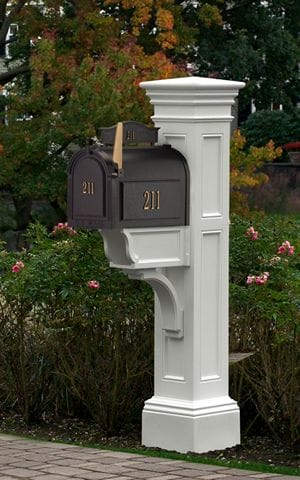You can have the best design and great ideas, but if the project doesn’t include some important finishing touches, it may fall flat. That goes for the outside of your house as well as the inside. And when you’re talking about the front of your house, it’s even more important. The front yard is what everyone usually sees first when driving up to a house. So pay attention to the small things below — getting these details right will create a thoughtful, finished front yard that says, “Welcome.”
 1. Mailboxes. Why have the same-old same-old when you can do something special? A stone pillar with an inset box, an elegant black wrought iron box or even a standard mailbox painted a cheerful color are spruced-up versions of this necessity. And don’t forget some simple landscaping around your mailbox — plant colorful flowers that greet your postal carrier and passersby, but forgo any plant that has thorns or spines, such as roses or agaves.
1. Mailboxes. Why have the same-old same-old when you can do something special? A stone pillar with an inset box, an elegant black wrought iron box or even a standard mailbox painted a cheerful color are spruced-up versions of this necessity. And don’t forget some simple landscaping around your mailbox — plant colorful flowers that greet your postal carrier and passersby, but forgo any plant that has thorns or spines, such as roses or agaves.
Tip: If your neighborhood has a homeowner’s association or design review board, check for any guidelines pertaining to mailbox construction.You may be obligated to install a certain type of box to conform to the look of the neighborhood.
2. Address numbers. There are so many options for house numbers now that there really is no excuse not to have something interesting and classy. You could order some custom numbers by mail, but even home improvement stores offer a wide range of numbers in different finishes and styles to suit many styles. You could even spell out the numbers; this option is best for houses with three or fewer numbers for easy reading.
Tip: Put your address numbers on a front fence, stone entryway column, the side of your mailbox or even a large boulder or upright flat rock in your front yard. Just make sure the numbers are visible from the street.
3. Water features. If you’ve ever thought about having a fountain, don’t feel like you need to relegate it to your backyard. Position your fountain by your front walk, entry or garden bed. Choose from ready-made fountains in concrete or metal, custom features made from glazed pottery or simple, unassuming fountains that bubble up through rocks.
Tip: If you are planning a water feature away from your entryway or foundation, you may need to hire an electrician to install an electrical outlet for the water pump. Be sure it’s made for outdoor use and has a GFCI (ground fault circuit interrupter), which will automatically shut off if the system senses the current flowing along an unintended path (such as water), reducing the risk of electrical shock.
4. Front door. Of course your house already has a front door, but consider making it stand out with color. Many houses have side entrances or long front facades, making visitors guess where they are to enter. Give them a strong hint by painting your door in a color that stands out but coordinates with the rest of your house’s color scheme.
Tip: Doors painted in a different color from the house’s trim are welcoming and make for a much more visually interesting front yard.
5. Birdhouses. Whether they hang from a tree or are mounted on posts, birdhouses are welcome additions for birds visiting your yard. They also tell your neighbors that you care about what goes on outside your home and are connected to the outdoors. And don’t worry if the usual country style birdhouses don’t fit your decor — there are a number of very contemporary digs for birds on the market now.
Tip: Find out about the type of birds you are trying to attract. Purple martins, for example, need a particular kind of birdhouse installed a certain number of feet away from a house.
6. Garden art. Small pieces of decor add so much nestled into a garden or displayed on a porch or entryway. Think gazing balls, welcome signs, small statues and mosaic stepping stones tucked into corners of your garden. Visitors almost have to draw near to see them, making them delightful discoveries.
Tip: A little goes a long way. Unless your aim is to have an over-the-top artsy front yard, limit your garden art to a few well-chosen pieces to complement rather than compete with the surroundings.
Jenny Peterson
Houzz Contributor.
Leave a Reply